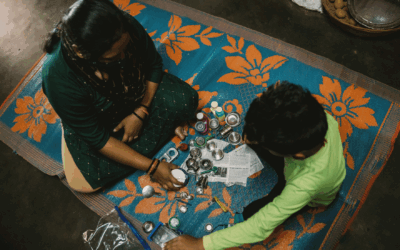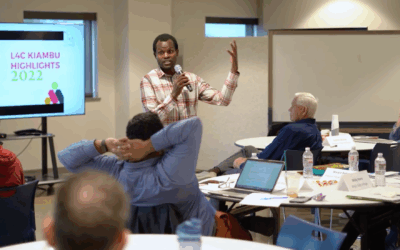MJF catches up with their partner, Harum Family Center
The Martin James Foundation (MJF) works with partners around the world, including HARAPAN UMMAT (Harum) in Indonesia. Since 2005, Harum has supported many families with parenting skills and access to education. They are one of the first organisations mandated by the Government to pilot foster care in the region. MJF recently caught up with M. Noor Choirullah, Director of Harum Family Center and Ari Setiawan, Assistant Coordinator of the Foster Care Program at Harum, about their journey to implementing foster care in Indonesia.
MJF: CAN YOU SHARE HARUM’S JOURNEY TO IMPLEMENTING FOSTER CARE IN YOUR REGION?
In 2014, we were appointed by the Indonesian Ministry of Social Affairs as a model care institution that has successfully implemented parenting support for children in vulnerable families and prevented family separation. And since 2020, we have been part of piloting the Foster Care Program, which positively impacts the psychological development of children in need. We’re working with the Government to implement this program and support families that already care for children in informal arrangements to complete the statutory process of becoming approved foster carers. We are also raising awareness of foster care and the positive impact of family-based care with the local social service offices and within the community. We hope that many people are interested in becoming foster parents, as the number of children who need families is increasing, especially with the impact of Covid-19. Since Harum started in 2005, our values and commitments have been built on a belief that family care is the best. So, we are happy to be part of this work.
WHY IS FAMILY-BASED CARE IMPORTANT?
We believe that family care has a significant impact on children because parents and carers can meet the children’s psychological and physical needs. The reality is that most children in orphanages will not experience holistic care and the proportion of caregivers to children is far from balanced. There are no clear standards for health, hygiene, and handling children in need. One thing that is especially concerning is how children are forced to leave all their activities if there are visits by orphanage guests or donors. Children are being exploited in disguise. Some children have never been visited by their families, they feel abandoned and unwanted by their parents, and the problem is that there are no psychosocial support services for these children.
BEFORE FOSTER CARE REGULATIONS WERE BEING IMPLEMENTED, WHAT WAS THE PROCESS FOR CHILDREN IN NEED OF ALTERNATIVE CARE?
In Indonesia, there has been a pattern where people immediately place children in orphanages when they were neglected, in need, or victims of violence, even though they still had extended family or kin. Moreover, some people practice unregulated or illegal foster care and adoption, causing the child’s lineage to be lost.
WHAT IS THE NEED FOR FOSTER CARE?
Foster Care is the main form of alternative care after kinship care. It is in the child’s best interest to grow and develop in a family, and many children need a foster family after being referred to social services. Also, there are more than 50 orphanages in our area, and those children desperately need placement in the family, not in orphanages. Since we became the agency appointed by the Government to carry out the Foster Care Pilot, there have been children in need of care referred to us, and we currently have nine children who need temporary care support. The Foster Care program becomes an alternative parenting bridge, and the best permanent care for children could be returning to live with their families or adoption.
TELL US HOW COMMUNITY LEADERS AND MEMBERS ARE RESPONDING TO THE IDEA OF FOSTER CARE AND FAMILY-BASED CARE?
While formal Foster Care is new, there are traditional care methods in our region similar to foster care. As we aim to increase public awareness about FC, one challenge we face is that most people think orphanages are the natural and necessary main solution when children don’t have families. Many don’t know that children in orphanages still have parents. Some child activists see this as an opportunity for alternative care solutions, while others think that requirements and procedures are too complicated, making some reluctant to carry out or legalise foster care.
CAN YOU SHARE A POSITIVE STORY THAT HAS EMERGED AS YOU HAVE STARTED PILOTING FOSTER CARE?
We have found that many families have good hearts and want to help take care of their children, even though their economic status is still in the poor category. They have a passion for helping make children happy. Good parenting does not know socio-economic backgrounds, and we found foster parents who have a blessed heart. Even though their circumstances are limited, they are still wholeheartedly willing and able to give a home, love, affection, and care for children who have been abandoned. Although we encounter many obstacles to implementing foster care in communities, we are encouraged that it is beginning to get attention from the local governments.
WHAT ARE THE DIFFERENCES YOU SEE IN CHILDREN WHEN THEY ARE IN FAMILY-BASED CARE?
From our experience running a family-based care program, children in family care get personal support and attention. They feel relatively no different from most children because they are in the care of a family that accepts and loves them. Therefore, children in family care tend to be more confident, physically, and emotionally healthy, and even have outstanding work or achievements than children in orphanages.
WHAT INSPIRES YOU AND YOUR TEAM TO CONTINUE, DESPITE THE CHALLENGES YOU MIGHT ENCOUNTER?
Our experiences assisting children in orphanages and three slum areas made us feel a call and a moral responsibility to do something. The knowledge, access, and experiences we have gained about what is best for children and the consequences of inappropriate care inspire us to continue doing what we can to support these children in need. The challenges we face also allow us to become more resilient, creative, and smart in our approach. Of course, our meeting with MJF, Key Assets and other global organisations made us even more optimistic. It encourages us that there are still many people who care about the future of children, especially our children in Indonesia.
Learn more about MJF’s work with Harum by visiting https://martinjames.foundation/partner-harum-family-center/



